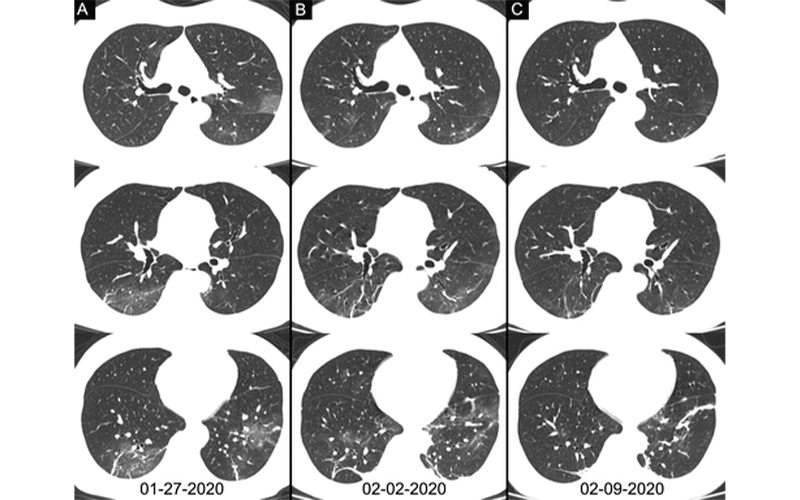COVID-19 Research Receives RSNA Margulis Award
Groundbreaking early research demonstrated that chest CT outperformed lab testing in the diagnosis of COVID-19


Liming Xia, MD, PhD, received the ninth RSNA 2020 Alexander R. Margulis Award for Scientific Excellence during RSNA 2020 for his study, “Correlation of Chest CT and RT-PCR Testing in Coronavirus Disease 2019 (COVID-19) in China: A Report of 1014 Cases.” It was published in Radiology in February 2020 and provided valuable information in the early days of the COVID-19 pandemic.
A Pioneer in COVID-19 Research
Dr. Xia, chief physician and chairman of the Department of Radiology at Tongji Hospital of Tongji Medical College in Wuhan, China, was among the first to study the role of chest CT in diagnosing a then unknown viral pneumonia that broke out in December 2019 in Wuhan.
“In a study of more than 1,000 patients, this outstanding research paper offered critical information to radiologists worldwide in the earliest days of the pandemic regarding the use of CT scanning,” said Radiology Editor, David A. Bluemke, MD, PhD.
COVID-19 spread quickly throughout the world. With no therapeutic drugs or vaccines available to treat the novel virus, early diagnosis of COVID-19 was crucial for disease treatment and control.
“It was a difficult time,” Dr. Xia said. “We knew little about the disease, and the most urgent goal was to contain the spread of COVID as much as possible.”
While reverse-transcription polymerase chain reaction (RT-PCR), or gene sequencing for respiratory or blood specimen, was the standard for detecting COVID-19, the method had demonstrated a high false negative rate and low sensitivity, possibly hindering quick diagnosis and timely treatment.
“At the time, RT-PCR testing was in short supply with delays of up to a week for results,” Dr. Bluemke said.
In response to the crisis, Dr. Xia and colleagues quickly launched an investigation of the diagnostic value and consistency of chest CT compared to RT-PCR in detecting COVID-19.
Research Timing was Critical
The study included 1,014 patients from Tongji Hospital, the largest hospital in Wuhan. All patients underwent both chest CT and RT-PCR tests between January 6 and February 6, 2020.
With RT-PCR results as the reference standard, the sensitivity, specificity, and accuracy of chest CT in indicating COVID-19 infection were 97% (580 of 601 patients), 25% (105 of 413 patients), and 68% (685 of 1014 patients), respectively. The positive predictive value and negative predictive value were 65% (580 of 888 patients) and 83% (105 of 126 patients), respectively. The results showed that chest CT was more effective than RT-PCR lab testing in detection of COVID-19.
“Our data and analysis suggest that chest CT should be considered for COVID-19 screening, comprehensive evaluation and follow-up, especially in epidemic areas with high pretest probability for disease,” the authors wrote.
Dr. Bluemke said the timing of the research early in the pandemic was particularly valuable to a world in the midst of crisis.
“At that time in particular, clinicians needed to understand the use of imaging for COVID19 pneumonia,” Dr. Bluemke said. “The results of Dr. Xia and co-authors still serve today as the fundamental basis for this understanding.”
Dr. Xia expressed gratitude for the award and recognized the contributions of his co-authors. Dr. Xia’s Radiology study has been downloaded more than 400,000 times and has been cited more than 770 times.
Named for Alexander R. Margulis, MD, a distinguished investigator and inspiring visionary in the science of radiology, this annual award recognizes the best original scientific article published in Radiology.
For More Information
Access the Radiology study, “Correlation of Chest CT and RT-PCR Testing in Coronavirus Disease 2019 (COVID-19) in China: A Report of 1014 Cases.”
Visit the updated RSNA COVID-19 Resources webpage for the latest RSNA announcements, radiology research, statements and guidelines, imaging data sets, industry resources, education links for radiology trainees and webinars.
Read the RSNA News coverage of previous Margulis Award recipients:
- AI-Powered Alzheimer’s Research Earns the Margulis Award (2019)
- Research Showing AI May Help Diagnose Tuberculosis in Remote Areas Captures Margulis Award (2018)
- Radiogenomics Research Receives the RSNA Margulis Award (2017)
